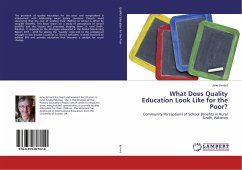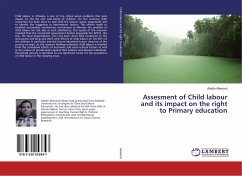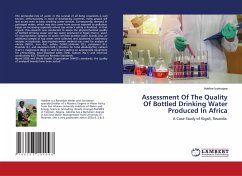
What Does Quality Education Look Like for the Poor?
Community Perceptions of School Benefits in Rural Sindh, Pakistan
Versandkostenfrei!
Versandfertig in 6-10 Tagen
55,99 €
inkl. MwSt.

PAYBACK Punkte
28 °P sammeln!
The provision of quality education for the poor and marginalized is intertwined with addressing social justice concerns. Parents need convincing that the cost of sending their children to school is offset by tangible benefits. This book draws on a study of perceptions of school benefits and the factors and processes shaping them, in rural Sindh, Pakistan. It responds to the strategies advocated in the Global Monitoring Report 2013 - 2014 for solving the "quality" crisis and to the widespread struggle in low-income countries to recruit sufficient, trained teachers to achieve EFA and provide edu...
The provision of quality education for the poor and marginalized is intertwined with addressing social justice concerns. Parents need convincing that the cost of sending their children to school is offset by tangible benefits. This book draws on a study of perceptions of school benefits and the factors and processes shaping them, in rural Sindh, Pakistan. It responds to the strategies advocated in the Global Monitoring Report 2013 - 2014 for solving the "quality" crisis and to the widespread struggle in low-income countries to recruit sufficient, trained teachers to achieve EFA and provide education that becomes a catalyst for social change.












